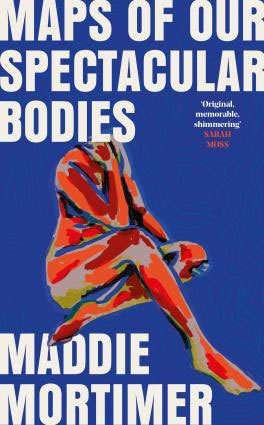Colour
Iris’s favourite colour from ages five to six had been pink. She had liked it so much that she had insisted she only eat pink foods, drink pink drinks. She wanted her insides to turn a bright shocking fuchsia and Lia had said, Well for that I prescribe beetroot.
Iris remembered staring at her shit in the toilet bowl after two weeks of beetroot, feeling superhuman.
But pink was just a phase. Just a gesture of something or somewhere Iris wanted to get to. She moved through and out of it a little wiser, a little more sensitive to the causality of colour and consumption.
And now, at her best age yet, it was Yellow.
Lia liked this phase more. It felt grown-up. Bold. She drew Yellow often as the fluid intangible thing that it was, sometimes a blot of gold light, a sharp buttercup tongue, a smudge of a small girl hiding in a streetlamp. All the codes around the house became yellow; the Wi-Fi, the house alarm. Lia would lace out yellow word-talks at night, discuss its pigment-science and etymology;
She derives from the proto-Indo-European root ‘ghel’,
‘to shine’ –
the mother of some magnificent words such as:
Glance
Gloaming
Glitch
Gloat
Glee
Gall
Glisten
Cloris
Chloroform
Melancholy
It’s back, Lia said, one pocketless Sunday to a patchy wall while the two of them were painting Iris’s room yellow. She felt so cowardly; so gutless, so sorry. Iris nodded solemnly.
I thought so.
She leant her head lightly against Lia’s arm for a moment, before reaching down to dip her finger in the yellow paint. She stretched her arm up, marked her mother’s forehead like a blessing, and then did the same to herself. Lia smiled sadly, and they both continued to paint with their matching triangle forehead tattoos and their individual rollers pushing, coating, sponging harder with every stroke as if they could erase all the facts and start again.
Once they were done they stepped back and stared at their work.
It’s so garish and satisfying, Lia said. Iris grinned and wiped away strands of sweaty hair stuck to the sides of her face.
What colour would you be?
I don’t know. Maybe a brown. Or a purple-grey.
Iris looked up to the ceiling and laughed one of her wide-open golden laughs and said, No no no, you’re just saying that because you’re old. Old people can be bright too.
That night in bed, still marked with her yellow blessing, Lia said, She’s amazing.
Harry said, Yeah. She’s all right.
He smiled widely and pressed his palm to his wife’s cheek. She kissed his wrist and said, I don’t want to die. He took a heavy breath. It smelt of earth. Every Sunday Harry would fall asleep with stains of their garden still on his hands. It is important not to put gloves on, he would say, it is important to feel the soil, let the dirt get under your fingernails, you need to hear through tips of skin what it is the world wants.
Lia enjoyed the sight of him labouring over their tiny slice of land.
Harry pressed his lips to her neck and then her earlobe and tried not to scream.
It was the first time either of them had ever mentioned death out loud. That crawling, colourless word. It seemed to move between them like a changeling; unfamiliar, restless, new.
Lia lay awake with her eyes closed. Feeling death’s breath on her face, his probing chubby fingers playing with her eyelashes, she listed off yellow things to keep afloat:
Bananas
The sun
Egg yolk
Cheese
Autumn leaves
Rubber ducks
Sundays
The waterproof plasters in the bathroom
Butter
Patience
Lemons
Iris’s blazing spirit
Yellow
Ah. Here. You can tell the ones that mean the most because they are more than gabble-panic fragments or faceless voices. For example:
We will call this one Yellow.
This one’s good.
She is skipping along the walls, flushed gold with the excitement of it all, and I am reminded of sunlight
sliding along the side of a house.
The sight of her makes me a little achy,
a little soft and breathy like a Marilyn birthday song
or a Christmas cold.
She listens closely, waiting, as voices splice through the hot air in various directions, pitches, squawks, clamours;
Off-kilter! Rotten! Sour!
Let’s fix it! Slay it! Snuff it out! Delay it!
Blood feels mighty thin.
Must be vigilant, cautious.
Trust no one.
She laughs. It’s so gentle a laugh it catches me off-guard.
What’s the plan? When can we start?
You search the liver and we’ll search the heart!
Soon, she says, soon, when everyone gets here.
The light of Yellow’s voice is so warm and bold I feel it clasp me, spoon me up, and for a moment I know what it feels like to be a mouse in a child’s palm or yoghurt touching lips for the first time, but the chorus launch excitedly again into their speculations and I am back, back thinking, Oooooohhh how I do love these beginnings before the pen is sharpened, the cannons are lit, the pistols are fired. Before the search begins.
The Great Democrat
When Iris was seven, her teacher asked everyone to write down what their parents’ jobs were and also suggested they drew a picture as a Creative Exercise.
There were shopkeepers and teachers and nurses and dentists, dads in IT with computers for hands, a mum drowning in bank notes, another with a spade potting small flowers with faces on.
Iris had written
CANCER
across the page.
She had drawn a creaturely cell with licks of ink fingers searching out from all sides, and in the cell’s centre was a mouth, but the mouth was not ominous – instead it wore a sort of sad I’m-ever-so-sorry smile. A stick-figure mum with long red hair and hands bigger than her head stroked the cell like a pet.
When it was Iris’s turn to present her work to the class, she stood and held the sheet of paper up proudly.
Teacher coughed out a laugh covered in thorns.
That isn’t funny, Iris.
A boy at the front with the computer-hand dad frowned.
But Miss, you just laughed.
It’s OK, Iris had said. It’s fine. Lots of people don’t know how to handle it.
We do we do we do we do.
The class sang quite suddenly:
My aunt has it my dad had it my grandma my neighbour my dog my babysitter’s boyfriend’s mum has it.
Iris’s face remained solemn, her eyes widened by the thrill of sudden responsibility.
Do you want to see how it works?
Show us show us show us.
It’s all about cells, see.
She dragged her tiny chair to stand on, up in front of the whiteboard, its metal legs shrieking against the vinyl floor. Teacher hadn’t the heart to stop her. She drew a diagram of cancer in the body and the way that it works, the way it sometimes multiplies and travels through different systems, like the cir-cu-la-to-ry or the lum-pa-tic-ory but sometimes, most of the time, it gets destroyed by other clever chemical creatures that stop it in its tracks. She told them how breast cancer which was her mum’s cancer had lots to do with lymphs, which were these spirits like nymphs but without wings – they controlled a great deal of very complicated things – and the kids had sat and watched in awe.
Everyone learnt something that day.
Iris took the picture home and Lia framed it on the wall that got all the sun in their kitchen.
Thank you, lovely.
For what?
For drawing me with all that long hair.
Oh. Well, I wasn’t going to let them know I had a bald mum.
Lia often thought of this time. Thought of Iris sitting in hospital waiting chairs with her tiny legs dangling down,
spotted tights,
small shoes,
glowing face,
asking questions like,
What have you got?
As if the world was a competition of terribleness and they would absolutely win it.
But this time there was no Iris.
There was hair, but it had grown back so tentatively, so undecidedly she almost wished it hadn’t at all.
Lia was sitting in the hospital waiting for instruction with her mother, who looked hollowed out.
Anne had insisted she be there. She had accompanied Lia to her chemotherapy sessions a few times before, and Lia was convinced Anne had decided hospitals were safe, perhaps even ideal environments for Mothers Making Amends. It was the fact of their being supervised by nurses, perhaps. Restricted by noise regulations. Rooted to the place, immovable, through the drip in Lia’s arm. Lia was trying not to feel pleased to see her.
Anne was wearing the same grey cardigan she wore for special days like Palm Sunday or the Pentecost. She had meant this thoughtfully, but it just made everything feel monumental and sombre.
They hadn’t said much to each other since they had arrived, both staring blankly ahead at children’s drawings, pinned up from their corners on a noticeboard. As if prompted by the bad art, Anne turned and asked suddenly, How’s work?
Good. Fine.
What’s this one called?
Lia kept her face as straight as she could.
A Children’s Guide to Lexical Spectacles.
Anne frowned. She searched Lia’s expression for the answer to whether this was a joke.
Really?
Yes. It’s an interactive language learning book. Supposed to encourage creative thinking. That sort of thing.
How unusual, Anne said, adjusting her body in the seat, hoping the exchange had reached an acceptable conclusion.
Lia had been producing these sorts of books since Iris was born. Lexical Spectacles had been inspired partly by their many years of bedtime word-talks. She had been working on the illustration plans for a few months, now; each lexical entry would be surrounded on the page by sketches, paintings, loose strokes of wild landscape or precise, inky detail, depending on the word, and at the end of each lexical entry –
a blank space,
to fill in one’s own definition.
The words could be homonyms, like bolt, buckle, entrance, fair, hatch, mine, squash. Or just beautiful, unusual words. Cherish or cascade. Elixir. Susurrus. Petrichor.
Anne looked relieved when the nurse called them in.
Here was the Current Situation:
There was a small scattering in
the liver, just a shade,
a deep sore kiss of it,
ink blotting about in the lung.
Both doctor and Wikipedia said: when breast cancer spread to the lungs or liver it could be treated but could not be cured.
Lia had grown very fond of her doctor. He had been looking after her and her insides for eight long years on and off and was the perfect cancer doctor in every way, except for the fact that he had just gone and died.
It is ridiculous that doctors die.
It is ridiculous that oncologists can die of cancer.
She asked the nurses how this could possibly happen when surely he had VIP access to all of the most sought-after, tried and tested, tumour-blitzing drugs, and they raised their eyebrows and said it did not really work like that. Knowing something inside out does not make you immune to its power. Lia thought of difficult mothers and books she’d read a thousand times that still made her cry and thought, yes, this seemed very true.
So here was a new man in front of them with this younger face, black emperor eyes, and something very uncomfortably confident about the way he twitch-sniffed his nose before he answered a question, like he was gathering drips of Important Information at the back of his mouth, relishing in the new tastes of life-death data.
He may have also had a cold.
This one – it’s a bit of a beast, he said.
Anne’s eyes paced the room.
Nicknamed the Red Devil.
She puffed her chest out, let out a small thin sound, which was followed by an abrupt stillness.
Because of its colour, its toxicity, its very strong, very severe side effects.
Lia nodded along to his medical song, his chemotherapy combinations, his Doxorubicin, mustard gas, Cyclophosphamide, his nausea and vomiting and low blood counts and anti-sickness pills and rapid growth and targeting cells, and as her mother made her final wince at the strike of the ‘cell’ word,
Lia wondered what it was that she thought bodies were made up of;
just bones,
light and
holy water, perhaps –
Let’s see how you handle this first, the doctor said, looking at her suddenly very seriously.
First?
Yes. First.
Can’t that be all? Won’t it work?
Shhh, Mum.
There was the clasping of bruised speckled hands,
Lia’s thumb pressing gently on her mother’s soft purlicue.
Image © Pawel Czerwinski









